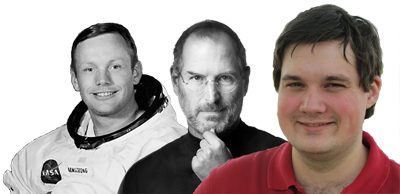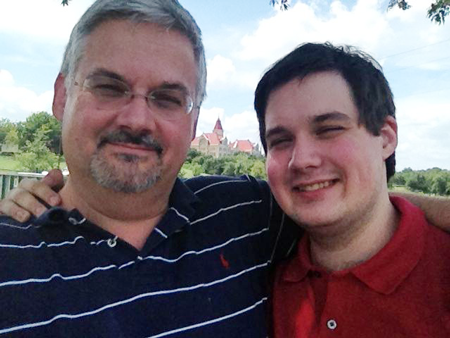 Some weekends it seems everything happens at once: Friday, Apple won their copyright case. Saturday, we lost a hero with the death of Neil Armstrong. Then, Sunday, I experienced an amputation of sorts. The intersection of these events reminded me of a question I urge clients to keep asking.
Some weekends it seems everything happens at once: Friday, Apple won their copyright case. Saturday, we lost a hero with the death of Neil Armstrong. Then, Sunday, I experienced an amputation of sorts. The intersection of these events reminded me of a question I urge clients to keep asking.
“Houston, Tranquility base here….”
When Neil Armstrong and Buzz Aldrin set down in the Sea of Tranquility, the moon seemed a little closer to home. Beamed into our living rooms in fuzzy black and white, “one giant leap” redefined mankind.
8,915 days later, John Alex Moger first landed in my arms, transforming my personal brand identity. As a Dad, his upbringing and well-being became part of my daily life—until Sunday.
After what seemed only a blink of my eye, John was 18 and anxious to take his own giant leap: leaving home for college. He stepped onto the grounds of St. Edwards around the same time we heard Armstrong took his final breath, and just hours after news broke of Apple’s legal victory.
Invention vs innovation
Despite a jury’s ruling that Samsung had violated Apple’s iPhone copyrights, detractors still claim Apple doesn’t really invent anything and merely packages, brands and sells existing inventions. They miss the fact that Apple is in the innovation business: Apple’s innovation was aggregating technology in ways previously unimagined to create the iPhone—redefining an industry.
Innovating is every bit the accomplishment as invention—perhaps more so. Invention without application is opportunity squandered.
Apple didn’t invent the phone, but they took it where no phone had gone before. Armstrong didn’t invent walking, he was just first to do it on the moon. And, I didn’t invent sons but no one will deny Tracey and I created John (with the help of God above).
What defines you?
All accomplishment carries the risk of definition. I say Armstrong, you see the moon. I say Apple, you see the iPhone. I say Charlie, you see John’s dad. Getting caught up in any of these accomplishments might be understandable. It would also be deadly to growth.
Accomplishments, products, and children are best thought of as stages along the journey toward our greater purpose. Being defined by them limits you. When you sense that’s happening, ask:
What’s next?
As a good pilot, Armstrong knew to aim his aircraft just over the horizon lest he crash into it. We do the same when we innovate in business and life: aiming higher than seems necessary, seeing past now, imagining what’s next and reaching for it.
Armstrong’s moon walk might have defined a lesser man. Seriously, how on earth does one eclipse being first to walk on the moon? To Armstrong, though, the moon was just a mission completed. He returned asking, “what’s next?” (He was bitterly disappointed with NASA’s recent funding cuts to manned space exploration and spent his final years campaigning for it.)
Will Apple be defined by the iPhone? Steve Jobs opined in his biography by Walter Isaacson that once-great companies fail when they lose their spirit of innovation to become defined by their products instead of asking “what’s next?”
So, what’s next for me and John? My first mission is raising my children to be good citizens to our world; I’m not quite done with that. It is not, however, my only mission. While John’s absence at the dinner table will take some getting used to, I focus on what’s next for me, my family, and business.

John’s journey has only just begun; my little man is now his own planet, while I’m short one moon. It’s like Pluto in reverse. How grand, though, to orbit the same sun watching my son begin asking “what’s next?” for himself.
Leave a Reply